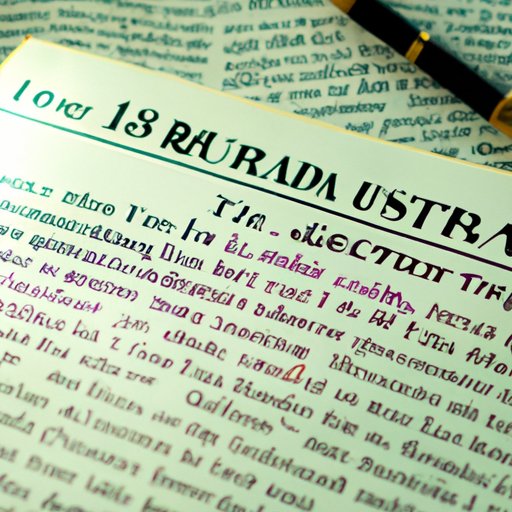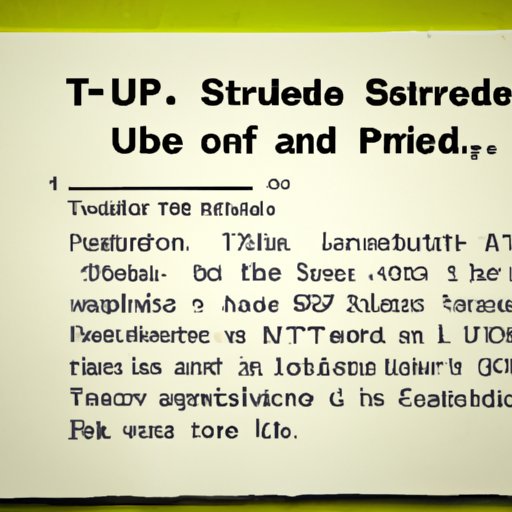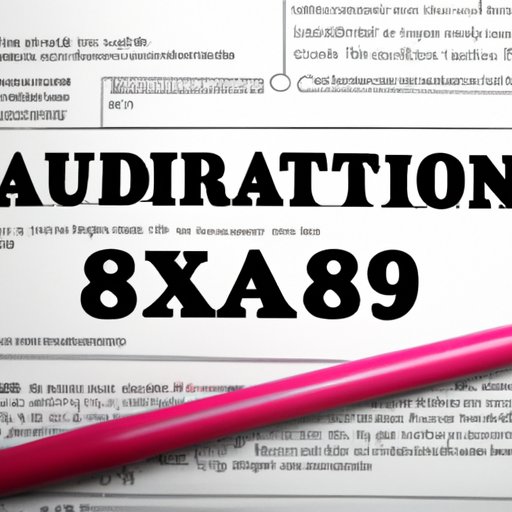Introduction
Section 199A of the Internal Revenue Code (IRC) provides an income tax deduction for owners of pass-through businesses, such as sole proprietorships, partnerships, limited liability companies (LLCs), and S corporations. To qualify for the deduction, the business must be classified as a “qualified trade or business” under the IRC. In this article, we explore what constitutes a qualified trade or business for Section 199A and discuss the benefits and requirements for qualifying.

Exploring the Definition of a Qualified Trade or Business for Section 199A
The IRC defines a “qualified trade or business” as any trade or business other than a specified service trade or business (SSTB). An SSTB is defined as any business involving the performance of services in the fields of health, law, accounting, actuarial science, performing arts, consulting, athletics, financial services, brokerage services, or any trade or business where the principal asset of such trade or business is the reputation or skill of one or more of its employees or owners. According to the IRS, “The determination of whether a trade or business is an SSTB is based on all the facts and circumstances.”
To better understand what qualifies as a trade or business for Section 199A, it is important to consider how the term “trade or business” is defined by the Internal Revenue Service (IRS). The IRS defines a trade or business as “an activity carried on for the production of income from selling goods or performing services.” This definition includes activities that are conducted with the intent to make a profit, such as operating a retail store, providing accounting services, running a restaurant, or operating a daycare center.

What You Need to Know About Qualifying as a Trade or Business Under Section 199A
In order to qualify as a trade or business under Section 199A, you must meet certain requirements. First, you must actively participate in the business. This means that you must be involved in making management decisions, have authority over financial and operational matters, and be actively engaged in the day-to-day operations of the business. Additionally, you must have a reasonable expectation of earning a profit from the business.
As far as taxation of income, the profits from a qualified trade or business are eligible for a deduction of up to 20% of qualified business income. This deduction is taken on your individual tax return and can significantly reduce your taxable income.

The Benefits of Being Classified as a Qualified Trade or Business Under Section 199A
Being classified as a qualified trade or business under Section 199A has several advantages. One of the primary benefits is that it allows you to take advantage of lower tax rates. The deduction available under Section 199A can reduce your taxable income, which in turn can lower your overall tax rate. Additionally, you may be able to deduct certain expenses related to your business, such as advertising costs, travel expenses, and office supplies.

How to Determine If Your Business Qualifies as a Trade or Business Under Section 199A
To determine if your business qualifies as a trade or business under Section 199A, you should consider the following factors: whether you are subject to self-employment taxes, whether you file a Schedule C with your tax return, and whether you are actively engaged in the business. If you are subject to self-employment taxes, have filed a Schedule C, and are actively engaged in the business, then your business likely qualifies as a trade or business under Section 199A.
Common Misconceptions about Qualifying as a Trade or Business Under Section 199A
It is important to note that not all businesses qualify as trades or businesses under Section 199A. Additionally, there is often confusion between a hobby and a business. While both involve activities that generate income, a hobby is typically something done for fun or recreation and does not have the intent of making a profit. A business, on the other hand, is an activity that is conducted with the intent to make a profit. Therefore, a hobby does not qualify as a trade or business under Section 199A.
An Overview of the Requirements for Qualifying as a Trade or Business Under Section 199A
Qualifying as a trade or business under Section 199A requires meeting certain criteria. First, the activity must be conducted with the intent to make a profit. Additionally, you must actively participate in the business and have a reasonable expectation of earning a profit. Finally, you must either be subject to self-employment taxes or have filed a Schedule C with your tax return.
Understanding the Implications of Being Labeled a Qualified Trade or Business Under Section 199A
Once you have determined that your business qualifies as a trade or business under Section 199A, it is important to understand the implications of being labeled a qualified trade or business. The primary implication is that you are eligible for a 20% deduction on your qualified business income. Additionally, you may be able to deduct certain expenses related to the business. It is also important to note that while the deduction can significantly reduce your taxable income, it can also limit the ability to claim other tax credits or deductions.
Conclusion
Section 199A of the Internal Revenue Code provides an income tax deduction for owners of pass-through businesses. To qualify for the deduction, the business must be classified as a “qualified trade or business” under the IRC. In this article, we explored what constitutes a qualified trade or business for Section 199A and discussed the benefits and requirements for qualifying. Understanding the legal definition of a qualified trade or business and the implications of being labeled as one are key to taking full advantage of the deduction available under Section 199A.
(Note: Is this article not meeting your expectations? Do you have knowledge or insights to share? Unlock new opportunities and expand your reach by joining our authors team. Click Registration to join us and share your expertise with our readers.)
